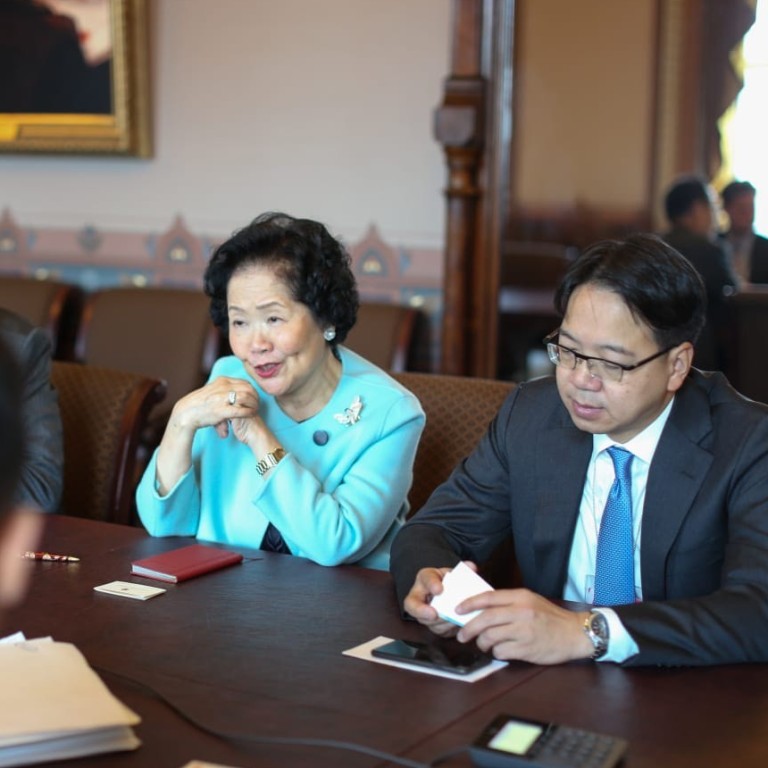
Hong Kong’s former chief secretary Anson Chan says leaders need to do a better job assuring world that city remains autonomous
- Chan suggests that Hong Kong’s leaders need to go to Washington and elsewhere and say they, not Beijing, are in charge
Hong Kong’s leaders are failing to allay concerns among foreign governments that the “one country, two systems” principle is weakening in the face of alleged interference by Beijing, Hong Kong’s former chief secretary Anson Chan said on Saturday.
A statement by a Hong Kong government spokesman said on Friday that the city continued to handle its own affairs in strict accordance with the one country, two systems principle, and emphasised that “foreign governments should not interfere in any form in the internal affairs” of the city.
Chan, Hong Kong’s former second-ranking official, found the reaction lacking.

“If the SAR’s assertion is that ‘All is well, you have nothing to worry about’, why do [they] not come to Washington and elsewhere and explain exactly what the situation is, and in particular stress that, in accordance with the terms of one country, two systems, it is the Chief Executive and her team who are in charge, not the liaison office, not Beijing,” Chan said.
Chan and two pro-democracy lawmakers – Legislative Council members Charles Mok and Dennis Kwok – are on a 10-day visit to Washington and New York at the invitation of the White House to discuss the state of Hong Kong’s rule of law with members of the Trump administration, as well as visiting with think tanks and bar associations.
Hong Kong’s former No 2 Anson Chan meets US Vice-President Mike Pence
“That really caught them, because it affects American people, citizens and businesses who are there,” he said.
The European Union was the first governmental body to express concerns about the proposed extradition changes and the possible impact “on EU citizens, either residing in Hong Kong or passing through it, and about the possibility of the re-surrender of fugitives”.
The proposals have also met considerable resistance from Hongkongers, who fear that Beijing could manufacture charges of white collar crimes to extradite political dissidents.
US says city can keep special status despite concerns over Beijing interference
“It defies reason that you’re making a distinction between white collar crimes and more heinous crimes such as murder,” Chan said of the proposals. “If the fundamental reason for not having an extradition agreement is mistrust, how can you distinguish between one group of offenders and another group? Everybody is entitled to a fair trial and to legal representation.”
The SAR government has defended the proposed amendments, asserting that Hong Kong courts would retain the authority to deny extradition requests that appeared political.
The US government has not publicly stated the circumstances under which it would decide that Hong Kong was no longer autonomous enough to warrant continuing the city’s special trading privileges, an assessment that is made yearly and issued in the State Department's Hong Kong Policy Act Report.

“If and when one country, two systems becomes one country, one-and-a-half systems, or one country and one system, then it seems to me legitimate for the administration to say then we have to review the entire basis,” Chan said, adding that such a move would have disastrous effects for Hong Kong.
“They expect Hong Kong to play a very significant role, a role that at the moment no other Chinese city or province can play because they don’t have the rule of law, they don’t have freedom of information,” she said.
The revocation of the US-Hong Kong Policy Act “would be the death of Hong Kong”, Mok said. “If we can’t work with the international firms, then we’ll get further integrated into the Chinese economy,” he said, adding that Hong Kong would “really become just another Chinese city”.
Beijing finally lays out China’s Greater Bay Area plan
Both Mok and Chan expressed hope that the international community, including the US, would continue to “shine a light” on the state of affairs in Hong Kong.
“We are still hopeful that our government, and even our business community, will wake up and say ‘Hey, [ …] we can’t just look north and ignore everybody else and everything else,’” Mok said.
Chan said she anticipated a “cacophony of noise” back in Hong Kong in opposition to the trio’s US tour and her meeting with Pence, with criticism among Beijing-aligned Hongkongers having already begun before the trio came to Washington..
“There were accusations we were selling out Hong Kong, we were going to bad mouth Hong Kong, we were going to assist the United States against China,” she said. “Which is all a load of rubbish.”
Mok echoed Chan’s remarks.
"We don’t want Hong Kong to be caught up in between China and the US in this trade relationship, but that doesn’t mean hiding our heads in the sand," Mok said. "We’re not getting involved. We’re just doing what our government should be doing."

